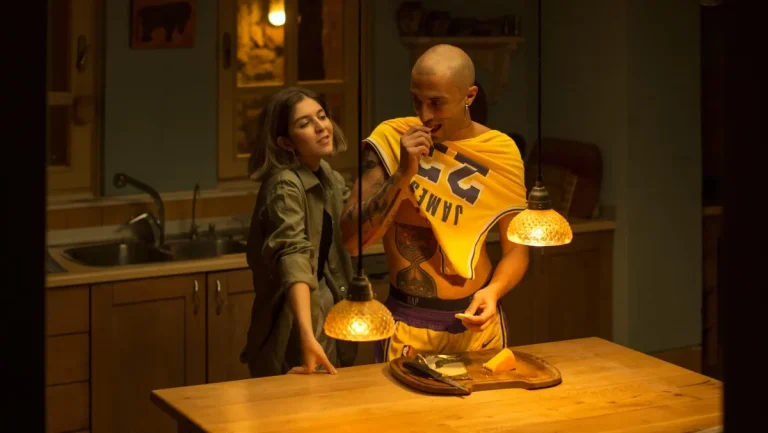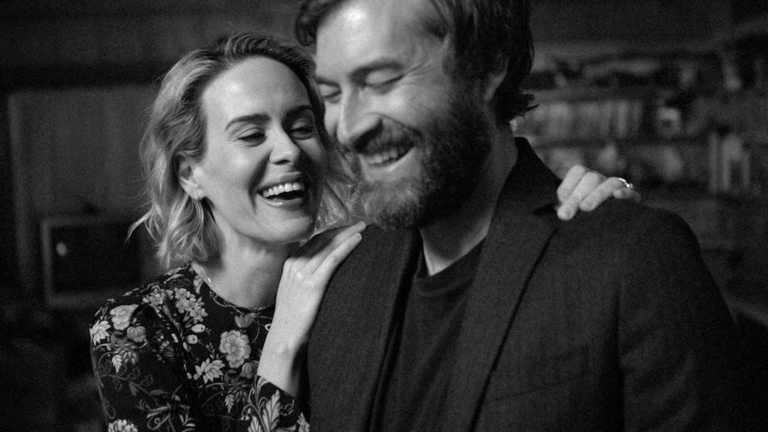Let’s go back in time to the year 1992 when an anime film with the title of “Ramayana: The Legend of Prince Rama” was released. Evergreen and surreal, this animation was and still is the talk of the town whenever the word “Ramayana” hits the mind. The Tale of Ramayana has been condensed and reflected in many films as mythical concepts through creative developments. Yet, director Prasanna Vithanage’s 2023 film Paradise takes a new turn from the epic tale with many surprises hidden under the table.
Prasanna Vithanage’s film starts with couples Kesav and Amritha visiting Sri Lanka for their 5th-anniversary vacation in 2022. The economic meltdown is at its peak in Sri Lanka in 2022, which is affecting the nation and the people tremendously. Bankruptcy, recession, and corruption have exploded into mass protests and riots among the people, slowly leading to chaotic circumstances. Within the process, we witness Kesav being on cloud nine as he has acquired a deal with Netflix, while Amritha is just happy with his success.
Everything seems to be on the brighter side for the couples, with the inclusion of staying on the hills of Sri Lanka. Kesav and Amritha are aware of the crisis around them, yet it doesn’t bother Kesav much. Amritha, on the other hand, feels a little disturbed by the whole situation. Little did we know that a major mythical setback was about to crash the lives of everyone.
Casting by Damayanthi Fonseka deserves the credit for selecting a perfect ensemble to uplift the film’s plot. Roshan Mathew’s engaging performance covers a wide range of method acting that lights up the life candle of Kesav. Almost self-centered and living his days through assumptions, Kesav does not bring much positivity to the changes around him. Kesav believes that he favors the nation by offering foreign exchange as a tourist. We also see Kesav through a negative lens due to his cynical perception of making decisions incorrectly. One example is a scene of Kesav confirming the identity of three men as burglars based on rough speculations.
There’s also the talented Darshana Rajendran as Amritha here. Her soothing yet meticulous acting skills have brought intense character establishment to Amritha. She delivers a spectrum of hope through her genuine smile and welcoming demeanor. She has a soft spot for animals, whereby she stops the killing of a Sambar deer during a hunting session. “It is too beautiful to be killed,” uttered by Amritha, indicates the depth of compassion that has shaped her. Her compassion for human life is also apparent from her quick decision to visit one of the alleged burglars in the hospital.
Shyam Fernando, a prominent actor from the Sri Lankan industry, delivers a brilliant performance as a tour guide and driver named Andrew. The characterization of Andrew comes with a few intriguing puzzles to showcase the many social layers in Sri Lanka. Furthermore, Andrew’s personal despair is felt through his gaze, which alerts him to the reality of the financial crisis. Andrew looks at the street while he drives around and realizes that his nation is in an unpleasant state. He immediately detaches himself from the role of a tour guide and crumbles into silence. It is as if Andrew is shaken by his concern for the future of his nation.

Hindu religion applauds the Tale of Ramayana as an epic masterpiece based on mythology and history. Prasanna Vithanage’s writing cultivates Andrew’s role as a reflective medium to show the varied perceptions of people on mythical beliefs. We hear Ravana’s end from Andrew’s point of view, where Ravana is in a slumber and does not die. He believes that Ravana will save Sri Lanka one day, which is debated by Kesav based on another theory. Meanwhile, Amritha hears the tale of the ordeal of fire (Agni Pariksha), where Sita jumps into the fire to be accepted by Lord Rama.
The act is said to be rooted in Lord Rama’s refusal to accept Sita as she has been with another man (Ravana). Amritha, a level-headed feminist, clarifies to Andrew the abundant versions of Ramayana as a prominent reason for multiple perceptions. She also questions Andrew on the ideologies of having men as saviors for women through these perceptions.
Another aspect that Paradise (2023) focuses on is the estrangement between the couples while the chaos builds. The difference in opinions and choices whispers a persistent clash between Kesav and Amritha. Kesav’s sudden urge towards Amritha to concentrate on her novel writing and not on blogs instantly touches a red flag. Kesav also doubts Amritha repeatedly about not locking the window during a tragedy, which indicates trust issues and a lack of belief. The fundamentals of a strong relationship degrade with time while the couples are pumped into a life pressure test. Director Prasanna has touched on the sensitivity of relationships from his 2012 film “With You, Without You,” starring Anjali Patil and Shyam Fernando. In both films, he uses the backdrop of the social environment of the nation to explore the relationship status of couples.
The usage of symbolism is present in many segments of Paradise. Sergeant Bandara, as the police officer in charge of the burglary case, is authoritative, ruthless, and hateful. Mahendra Perera, a regular cast member of Vithanage’s films, plays the role of Sgt. Bandara impeccably. Bandara symbolizes the darkness of Ravana in terms of destruction and wickedness through his work ethic and decision-making. Bandara’s lack of empathy towards the estate workers and evil tactics highlight the racial divide between the Sinhalese and Sri Lankan Tamilians. The vindictive nature that has grown within Bandara has not subsided even after the end of the Sri Lankan Civil War. Meanwhile, the Sambar deer that Amritha encountered in the hills symbolizes optimism and courage to reinvigorate her inner spirit. The deer seems to appear on significant occasions to awaken Amritha from her emotional battles.
The cinematography by Rajeev Ravi sets the film’s mood to be peaceful in contrast with the political and economic crisis. The tranquilizing view of Sri Lanka’s rocks and the hills becomes the escape route for Amritha to breathe safely.
Prasanna Vithanage’s Paradise (2023), which won the Kim Jiseok Award at the Busan Film Festival this year, is a poignant and affirmative film on power abuse by opportunists. Prasanna Vithanage’s visionary direction holds the viewers comfortably at an initial stage and then pushes them to a shocking climax. The beauty of Sri Lanka, abundant with culture and ancient history, has fallen into multiple misfortunes and catastrophes. Paradise voices the sufferings of the nation with a reference to mythical beliefs. Perhaps history has repeated itself where the malevolence of conquering power does not vanish easily.
What we hear and what we feel form the foundation of our beliefs. Truth can be a challenging aspect where the things we hear may not be the real answer. Everyone can have different beliefs based on their opinions, but the irony here lies in the reason to believe – Survival.

![Aligarh [2016]: A Tragic World of ‘Labels’](https://79468c92.delivery.rocketcdn.me/wp-content/uploads/2019/05/aligarh-2016-high-on-films.jpg)
![All U Need is Love [2021]: ‘NYAFF’ Review – A Quarantine caper solely for Hong Kong Cinema Enthusiasts](https://79468c92.delivery.rocketcdn.me/wp-content/uploads/2021/08/All-U-Need-is-Love.jpeg)



